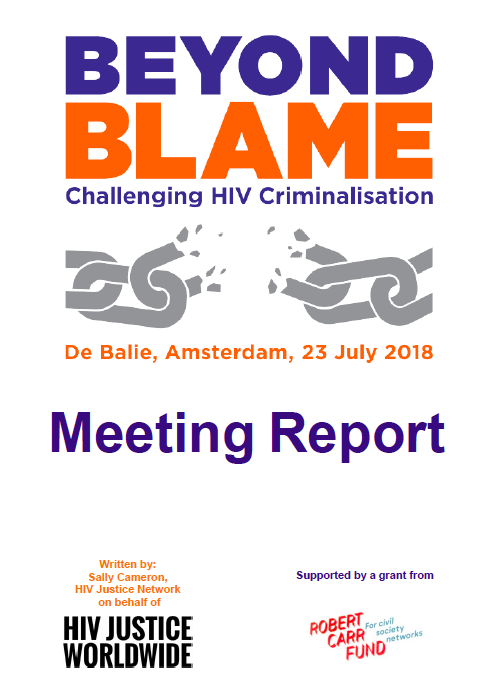Published in aidsmap on February 4th, 2019
HIV non-disclosure laws perpetuate social injustices against women in Canada
Jump to
People living with HIV in Canada can be charged with aggravated sexual assault and be registered as sexual offenders if they do not disclose their HIV status, but many HIV-positive women have little knowledge of this law, according to a recent qualitative study. The law contributes to increased HIV-related stigma, social injustices and vulnerability to violence for women living with HIV, argue Dr Saara Greene and colleagues.
Forty eight women took part in seven arts-based workshops which each took place over a four-day period. Each workshop included an education session regarding the legal implications of non-disclosure, followed by a focus group discussion that allowed women to share thoughts, feelings and concerns regarding the law.
Canada is one of many countries that continues to criminalise non-disclosure of HIV positive status in sexual acts between consenting individuals. Transmission of the virus does not need to occur: a person can be prosecuted for exposure to the virus in the absence of transmission.
In 2012, the Supreme Court of Canada clarified its position on HIV transmission, ruling that people living with HIV are legally required to disclose their status to sexual partners before engaging in sexual activities that pose a ‘realistic possibility of transmission’. According to the Court, two combined factors could be used as a defense against this realistic possibility of transmission: a low plasma viral load (under 1500 copies/ml) and the use of a condom.
Thus, the law does not acknowledge biomedical advances that conclusively show transmission is impossible if the infected individual is virally suppressed (see our factsheet on undetectable viral load and transmission). The ruling leaves room for those engaging in condomless sex with an undetectable viral load to be prosecuted. In Canada, a charge of aggravated sexual assault could carry a maximum sentence of life imprisonment and registration on the sex offender registry.
A more recent 2018 federal directive issued by the attorney general states that a person living with HIV who has maintained a suppressed viral load (under 200 copies/ml of blood) should not be prosecuted, because there is no realistic possibility of transmission. However, this directive only applies in Canada’s three territories and not in the provinces where the vast majority of the population live. Advocates are calling on the provinces to issue similar directives.
The workshops were carried out in 2016 and 2017, in three Canadaian provinces (Ontario, Saskatchewan and British Columbia). The median age of participants was 47 (range: 30-59); the majority of women were Indigenous (60%), with only a small percentage of white women (8%). It was important for minority women to be oversampled as HIV prevalence is nearly three times higher in Indigenous peoples across Canada, with high rates of HIV diagnoses occurring in young Indigenous women. Additionally, 42% of women charged with HIV non-disclosure are Indigenous.
Most women were heterosexual (73%), cisgender (94%) and born in Canada (79%). One-third of women were single, with 29% reporting a common-law relationship.
Analysis of the focus group discussions revealed the following themes:
Confusion and concerns regarding the law
Overall, the education sessions revealed that women were largely unfamiliar with and poorly-informed about laws pertaining to non-disclosure. Questions and concerns were related to legal implications (such as a whether charges could be brought against them for exposure in the absence of transmission or for sexual interactions several years ago). Several women asked what it meant to have a low viral load.
Social and legal injustice
Women felt that the law perpetuates existing injustices in the lives of diagnosed HIV positive women. Thus, factors such as stigma, sexism, racism, colonialism and a lack of education might put those already disadvantaged at a higher risk of being criminalised.
“Like even this isn’t accessible or something understandable for some of my people because we have literacy issues. Some of our people, they left residential school at grade 6 and grade 8…” (Jaqueline, Saskatchewan, speaking about a legal factsheet given to participants)
A contradiction inherent in HIV non-disclosure criminalisation law is that while individuals who are unaware of their HIV status and have a high viral load are more likely to unknowingly infect others, these individuals cannot be prosecuted under Canadian law as intent cannot be proven. The women expressed that the law unjustly targets those who are diagnosed:
“…When I was first diagnosed, I had a higher viral load because I wasn’t being treated. And so actually the silent people who don’t know are more at risk of passing it on. So, who is this [law] even protecting? We are the least likely to pass it on.” (Lori, British Columbia)
As a result of assault laws being used in non-disclosure cases, a common sentiment expressed by women living with HIV was that they were carrying a biological weapon. Thus, HIV stigma was internalised, as a result of the legal system depicting women as capable of inflicting serious harm on their partners:
“…If I was going to go over there and stab [participant] with a knife, that’s aggravated assault. So, they’re taking that knife away and using HIV. I may not have given it to her. So, it’s like the knife never even touched her or the knife wasn’t used. I’m still charged.” (Rachelle, British Columbia)
Sexual surveillance
Participants expressed a sense that they were under surveillance by the criminal justice system when it came to their sex lives. In order to prove innocence, women would need to provide evidence of both a low viral load and condom use, or of disclosure.
The researchers labelled this an ‘intimate injustice’, with HIV-positive women needing to prove their innocence within an inherently unjust and oppressive system. The lengths that women would have to go through to prove this innocence is reflected here:
“So how many people do you have in that room? You have the lawyer that’s witnessing the paper that you’re signing that you’ve disclosed. You have the doctor to say, ‘Yeah, you’re under a viral load’. You’ve got the forensic scientist there getting any evidence. You know, everybody is watching.” (Lilian, British Columbia)
A common question related to undetectability was:
‘So when I look at it, I’m undetectable. So, I cannot transmit HIV to who I’m going to have sex with. So why is it any of their business that I have it when I’m undetectable?’
Another common question was how to prove that a condom was used or that disclosure had occurred after a sexual encounter had taken place. It could come down to a ‘he said, she said’ situation, with the HIV-positive woman needing some form of conclusive proof that she had used a condom or disclosed her status prior to engaging in sexual contact.
“Okay, so say I had a sexual partner. I just met this guy. And my CD4 count is 880. I’m undetectable. But I’ve got to tell him before we get into bed. Do I need to make him sign a document and lock it up and have it witnessed by the neighbor?” (Zainab, Ontario)
Vulnerability to violence
Non-disclosure laws may place women at greater risk for violence. As many as 80% of Canadian women living with HIV have experienced violence in adulthood and the requirement to disclose HIV status to sexual partners could increase the likelihood of intimate partner violence by placing women in a vulnerable position.
Women expressed that they do not always have control over when or how sex occurs with their partners; this negates their agency when it comes to negotiating condom use or disclosing their HIV status.
There was also the question of how disclosure applied in cases of domestic abuse and rape. The law would require women to disclose to abusive partners, placing them at risk of even more violence. The troubling nature of this was expressed in this quote:
“I was raped by three [people] in [Canadian city]. They broke into my home and they held me prisoner for 24 hours and beat me and raped me. And if I had told him I was HIV positive, I would have been dead. I know it. So where does that fit in the picture?” (Julie, British Columbia)
Additionally, the law could be used against HIV-positive women by vindictive partners wishing to ‘punish’ them. Many women had been threatened with charges for non-disclosure by disgruntled partners:
“Could they turn around and even if you’re honest and told them, then … they lied and said, ‘Well, I caught it from her’, or him. And they go to the police and get them charged, just out to be spiteful and mean.” (Catherine, Saskatchewan)
Concerns over violence were particularly salient for Indigenous women:
“When you include the Indigenous community and the numbers and statistics there, like we’re already like 10 times the rate of being gone missing, murdered and, you know, facing violence every day. So, when you throw in … you know, HIV, you know, like it just becomes sometimes not even safe. A lot of people stay in very vulnerable situations because of this law…” (Jaqueline, Saskatchewan)
Conclusion
The researchers conclude that for women living with HIV in Canada, non-disclosure laws can lead to unjust victimisation, perpetuating legal and social injustices. Many of the women did not have the necessary legal knowledge to fully understand the implications of their sexual behaviour to begin with. HIV-related stigma has become legally entrenched and results in women who are anxious about sexual encounters and fearful that they will need to find ways of proving their innocence. Non-disclosure laws may also lead to increased violence against women.
When combined with factors such as sexism, racism, colonialism and violence against women, HIV criminalisation results in continued oppression and thus, advocacy for legal reform is necessary and urgent. The recent federal directive is a step in the right direction but it will still take some time for this to filter down to provincial police and prosecutors.
Reference
Greene S et al. How women living with HIV react and respond to learning about Canadian law that criminalises HIV non-disclosure: ‘how do you prove that you told?’ Culture, Health & Sexuality online ahead of print, 2019. (Abstract).


